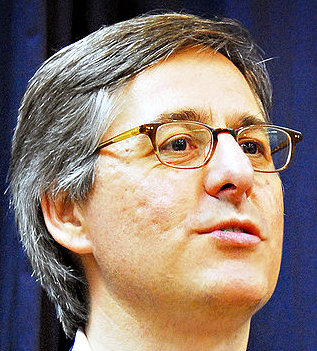

Original photo by Mark Coggins
WE SELDOM write about Dan Lyons, the clown who called himself "fake Steve Jobs" in order to piggyback some famous person's name. Dan Lyons is probably known within GNU/Linux circles for his vicious attacks on GNU/Linux, on Richard Stallman/FSF, and on Groklaw. Some years ago he was spreading rumours though some weirdly-named blog (not "fake Steve Jobs") and Florian Müller is currently bolstering his anti-IBM agenda using old speculations from Dan Lyons, who alleged without evidence that IBM was paying Groklaw (IBM denied this under oath). For what it's worth, earlier today Müller published a GNU/Linux-hostile blog post about the Munich migration, which is succeeding [1, 2]. This is nothing new from Müller, who previously helped stall the migration to GNU/Linux in Munich (Müller has told us that he uses Vista 7 on his desktop/laptop and never GNU/Linux). The funny thing is that Novell staff is helping him right now over at Twitter. One of Novell's Mono folks even misleads him by mischaracterising statistics. We use Varnish as a separate and static front end, so the actual Web server only gets used as a 'fallback' when the page requested is not cached or the user is logged on (so generic pages do not apply).
IBM Trying To Patent Cure For Obama's BlackBerry Woes
theodp writes "Appearing Thursday on The View, President Obama lamented that his BlackBerry was no fun anymore, noting that only about 10 people had his BlackBerry personal e-mail address. 'I've got to admit it's no fun because they think it's going to be subject to the Presidential Records Act so nobody sends me the juicy stuff,' he ruefully added. Coincidentally, the USPTO disclosed on Thursday that IBM has a patent pending for a Cellular Telephone Using Multiple Accounts, which provides multiple SIM card slots to address the problems faced by 'an elected official [who] may be under legal restraints regarding the nature of calls which may be made from a particular telephone.' Without its invention, explains Big Blue, 'an official may use one telephone for calls in an official government capacity; another for calls to a re-election committee; and another for purely personal use.' IBM ran to the patent office with details of the new 'invention' (image) just days after Obama was told he could keep his BlackBerry for personal use, but would have to use an NSA-approved phone for anything government related."
Last Friday, sanofi-aventis and Microsoft joined in filing an amicus curiae brief with the Federal Circuit in the Therasense, Inc. v. Becton, Dickinson & Co. case. The brief, filed in support of appellants and urging the en banc Court to reverse the three-judge panel's affirmance of inequitable conduct against Abbott, was limited to one of the "questions" posed to the parties and amici by the Federal Circuit when granting en banc review: "[w]hether the specific intent element of the inequitable conduct doctrine is properly derived from the common law" (see "Federal Circuit Grants En Banc Review in Therasense v. Becton Dickinson").
[...]
Intent generally is not required for patent infringement, a strict liability tort. It is only in "extraordinary situations," amici argue, that intent becomes an issue: for infringers when the allegation is for inducing infringement, and for patentees when the allegation is inequitable conduct. The brief argues that specific intent, defined as "[t]he intent to accomplish the precise act with which one has been charged" (reflecting the origins of the concept in criminal law) is the standard that a court should apply when establishing inequitable conduct.